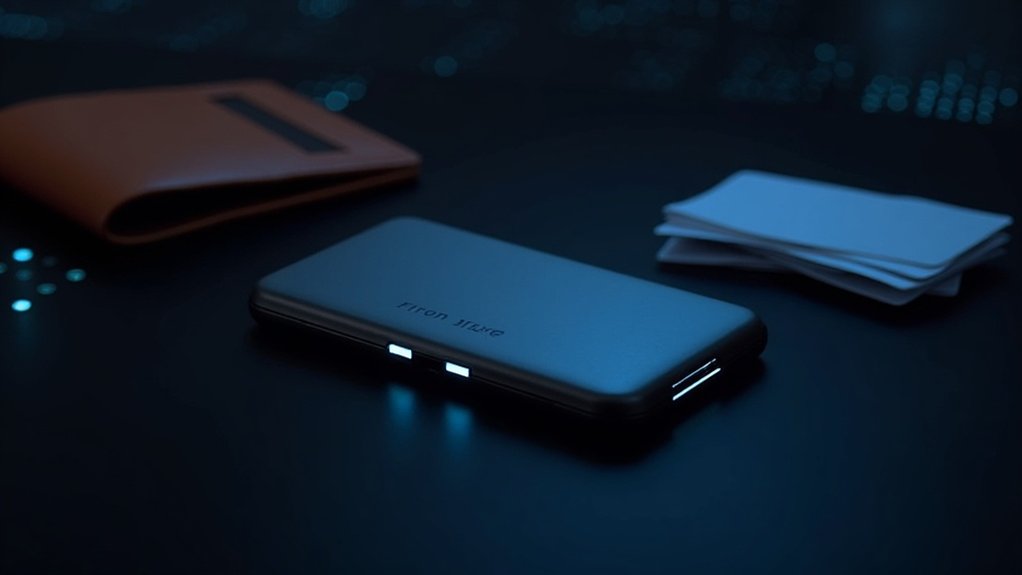Coinbase Wallet is a self-custody cryptocurrency solution that puts users in complete control of their digital assets. It stores private keys directly on the user’s device—no middlemen involved. The wallet supports multiple blockchains including Bitcoin, Ethereum, and various altcoins, plus NFTs. Available on iOS, Android, and as a Chrome extension, it features biometric authentication and requires a 12-word recovery phrase for backup. Lose that phrase? Kiss your crypto goodbye.
Coinbase Wallet stands as one of the most popular self-custody cryptocurrency solutions in the digital asset space.
Unlike the regular Coinbase exchange app, this wallet puts users firmly in control of their digital assets.
No middlemen.
No corporate oversight.
Just you and your crypto.
The wallet stores private keys directly on the user’s device—not on Coinbase’s servers.
That’s kind of the whole point.
Users must secure recovery phrases carefully since losing access means permanently losing their funds.
The security features are robust, if not downright paranoid.
Biometric authentication keeps nosy friends out.
A 12-word recovery phrase serves as your lifeline if your phone takes an unexpected swim.
Everything stays encrypted and local.
Your keys, your crypto. Period.
Compatibility isn’t an issue here.
The wallet supports multiple blockchains including Ethereum, Polygon, and Avalanche.
Bitcoin, Ethereum, countless altcoins—they’re all welcome at this digital party.
Even those oddball NFTs have a home here.
Users can send, receive, and manage their portfolio without breaking a sweat.
Available on iOS, Android, and as a Chrome extension, Coinbase Wallet aims for accessibility.
The interface won’t confuse your grandmother, which is saying something in crypto.
Link it to your Coinbase exchange account if you want.
Or don’t.
It’s delightfully optional.
Where this wallet really shines is as a gateway to the wild west of decentralized applications.
DeFi platforms, blockchain games, decentralized exchanges—they’re all accessible through this portal.
Want to stake some tokens?
Lend some crypto?
Trade obscure coins that sound like someone sneezed while naming them?
Go ahead.
The entire setup emphasizes user autonomy.
No permission needed to move your assets.
No company controlling your funds.
The wallet operates in a truly decentralized manner with all transactions and balances recorded directly on the blockchain rather than on company servers.
Coinbase Wallet supports the trading of thousands of cryptocurrencies through various decentralized exchanges, giving users unprecedented access to the broader crypto market.
Just pure, unadulterated ownership of your digital wealth.
In a space often plagued by exchange hacks and company collapses, that kind of control isn’t just nice—it’s necessary.
Self-custody: it’s not just a feature, it’s practically a crypto religion.
Frequently Asked Questions
How Secure Is Coinbase Wallet Compared to Other Crypto Wallets?
Coinbase Wallet stands among the safest hot wallets out there.
Self-custody model means you control your keys – not them.
Robust security features include biometrics, PIN codes, and token approval alerts.
Compatible with Ledger hardware for extra protection too.
Still, it’s online.
That’s inherently riskier than cold storage.
Both Coinbase and Trust Wallet offer similar non-custodial protection, but Coinbase adds insurance coverage – pretty rare in self-custody options.
Recovery phrase theft? Game over.
Can I Recover My Wallet if I Lose My Device?
Recovery is possible if the user has their seed phrase or cloud backup.
Lost device? No problem—reinstall the app on a new one and restore using that 12-word phrase.
No seed phrase? They’re pretty much screwed. Coinbase can’t help; they don’t have access to it.
Cloud backups work too, if they set those up.
Without either backup method? Those crypto assets are likely gone forever. Simple as that.
What Fees Does Coinbase Wallet Charge for Transactions?
Coinbase Wallet doesn’t charge its own fees for transactions between Coinbase wallets.
The catch? Network fees still apply.
These gas fees go to blockchain miners, not Coinbase.
For trading on the Coinbase platform, fees range from 1.49% to 3.99% depending on payment method and location. Pretty standard stuff.
The wallet itself is free to download and use.
You’re only paying when actually doing something with your crypto.
Network congestion? Higher fees.
Simple as that.
Does Coinbase Wallet Support NFTS and Defi Applications?
Yes, Coinbase Wallet fully supports NFTs and DeFi applications.
Users can view their NFT collections, primarily on Ethereum and Polygon networks, with quick indexing capabilities.
For DeFi, the wallet connects to decentralized exchanges and supports EVM-compatible networks for staking, lending, and yield farming.
Its built-in dApp browser enables seamless interaction with various protocols.
The non-custodial design keeps private keys local, offering security while maintaining a user-friendly interface for digital asset management.
Can I Connect Coinbase Wallet to Hardware Wallets?
Yes, Coinbase Wallet can connect to Ledger hardware wallets.
Users can link their Ledger through the browser extension or mobile app using step-by-step prompts.
Private keys stay on the Ledger device—much safer that way.
Transactions initiated in Coinbase Wallet require physical approval on the Ledger.
The setup supports Ethereum and other EVM chains, with options to add multiple addresses (up to 15 for Ethereum).
No importing recovery phrases needed—that defeats the whole purpose.









